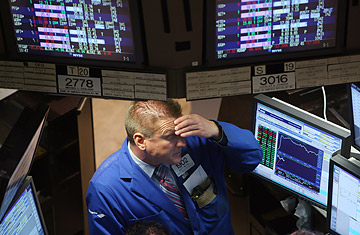
NYSE
If there's any doubt America faces its gravest financial crisis in decades, consider this sobering evidence: Pension plans for some of the 1,500 largest U.S. companies have lost about $280 billion so far this year.
In November alone, pension plans lost about $130 billion, marking the second consecutive month of record declines, according to a new report from Mercer, the financial consulting firm. The companies Mercer studied — those in the Standard & Poor's 1,500 index, which includes household names like 3M and Coca Cola — reported their pension plans ended 2007 with a $60 billion surplus. So the swiftness of this year's decline is astonishing. (Read "Is It OK to Pray for Your 401(k)?")
Mercer analysts attribute the developments mainly to the collapse of the equity market, in which many U.S. pension plans are invested. But pension funds are being hit on the other side of their balance sheet as well, as declining yields on Treasury bonds swell the size of their pension fund liabilities.
The pension crisis will likely aggravate an already bleak financial outlook for many companies, and may stimulate a debate about retirement policy in this country. Already, President-elect Barack Obama has moved swiftly to address the worsening economic and financial crisis. Now, a key question is how, or if, President-elect Obama delivers on his campaign proposal to require companies that don't offer employee retirement plans to enroll workers in a direct-deposit IRA account, which may help many low- and middle-income people participate in retirement programs for the first time. "You can't have companies going from a position of broad stability 12 months ago to having a hole of $280 billion in their pension plans," says Adrian Hartshorn, a lead analyst on the Mercer report. He added: "People are hurting because of the stock market, and there needs to be a national debate around how people save, in the long-term, for retirement."
In the last year, the funded status of the pension plans Mercer analyzed has fallen from an estimated 104% (a surplus) to 80% (a deficit). Now, companies are scrambling to determine how to make up the difference. There are two key ways to do that, with the easiest being a stock market recovery. But there's no telling when that will happen.
Ultimately, many companies will have to boost contributions to their pension plans to recover from this year's loss. How that occurs is partly governed by the Pension Protection Act. But experts say some companies will lobby for Congress to relax some aspects of the act, arguing that being forced to significantly increase contributions to pension plans may force them to file for bankruptcy. When President Bush signed the Pension Protection Act in 2006, companies won cost-savings concessions, such as the ability to use a higher interest rate in computing lump sump pension payouts. But the savings from those concessions have been swamped by stock market losses.
Barring relief from Washington, pension plan sponsors may revert to benefit cuts. Here's how that might work: A typical pension plan formula is based on an individual's ending salary, multiplied by a variable, such as .015, and then multiplied by the number of years of service. So an employee earning $150,000 a year, at age 60, with 30 years of service, would have the following formula: $150,000 x .015 x 30, which equals $67,500 annually in pension payments for the rest of her life. To reduce costs, a company can reduce that middle variable from, say, 0.15, to 0.1. That doesn't change what a 20-year employee has already earned in a defined benefit plan, but it would reduce the growth of his or her pension during the remaining years with that employer.
Some companies may eliminate, or freeze, pension plans altogether. On Wednesday, for instance, AK Steel, a leading automotive and appliance industry supplier based in West Chester, Ohio, announced it would freeze defined benefit pensions plans for salaried employees and replace with a defined contribution benefit plan that includes about 3% of a worker's annual salary. "Unfortunately, this extraordinary global economic downturn requires significant and rapid measures to reduce our costs in light of sharply lower order levels from our customers," James L. Wainscott, AK Steel's CEO, said in a statement.
It's worth noting that barely half of the companies that Mercer examined reported sponsoring a so-called defined pension plan: Simply put, it's becoming a relic, as companies scale back retirement options to shave one of the most expensive employee costs.
